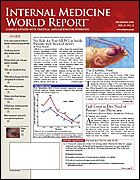Publication
Article
Internal Medicine World Report
Change in Resting Heart Rate Predictor of Long-Term Mortality in Men
Author(s):
Headache Another CV Marker in Both Genders
Chicago—In healthy middle-aged men, a change in resting heart rate over a 5-year period is linked to the risk of mortality. Men whose heart rate increases over 5 years are at increased risk of mortality during the next 2 decades. In contrast, those with a decrease in heart rate over 5 years are at a reduced risk of dying over the long-term, said Xavier P. Jouven, MD, PhD, at the American Heart Association annual meeting.
“Measuring heart rate is not expensive and not invasive,” said Dr Jouven. “The role of and measurement of resting heart rate has been underestimated as a health indicator. We have to devote more scientific attention to resting heart rate.”
He and colleagues followed 4320 men aged 42 to 53, all of whom had their resting heart rates measured at baseline (between 1967 and 1972) and then yearly during the next 5 years. Resting heart rate was determined by measuring the radial pulse during a 1-minute recording. (Because the study was conducted in men only, it is not clear whether this information can be applied to women or not.)
During the 20-year follow-up, 1018 of the men died. Participants were divided into 9 groups according to their baseline heart rate (≤60 beats/min, 61-75 beats/min, and >75 beats/min) and the change in heart rate from their first to fifth examination (decrease >7 beats/min, change of —7 to +7 beats/ min, and increase >7 beats/min).
After adjusting for standard cardiovascular risk factors, men whose resting heart rate increased by more than 7 beats/min had a 47% increase in mortality, whereas those whose resting heart rate decreased by more than 7 beats/min had an 18% decrease in mortality. This relationship persisted when using changes in resting heart rate as small as 5 beats/min or as great as 10 beats/min, said Dr Jouven, of the Hôpital Européen Georges Pompidou, INSERM, Paris.
The increased risk of mortality with an increase in heart rate occurred in men regardless of their baseline heart rate, he added. “We can’t say for sure whether the increase in resting heart rate is only a marker for some other disease process or whether it is directly associated with mortality,” he said.
Heart rate changes could occur as a result of changes in physical activity, medications, or anxiety or other conditions, or may be due to genetic factors. Because his study was initiated before the era of beta-blockers, this class of medications could be ruled out as a factor in the finding, he said.
Another cardiovascular risk factor in men is a history of migraine, reported Tobias Kurth, MD, ScD, of Brigham and Women’s Hospital and Harvard Medical School, Boston. The findings follow previous reports of a similar relationship between migraine and cardiovascular risk in women.
“We do not know how or why migraines are associated with in-creased cardiovascular risk,” said Dr Kurth. “Physicians and patients with migraine should pay even more ­attention to traditional cardiovascular risk factors such as high blood pressure, diabetes, cholesterol, smoking, and obesity.”
In the Physicians’ Health Study, men who reported a history of migraine at baseline had a 24% increased risk of cardiovascular events compared with men who had no history of migraine. The excess risk could be attributed to a 42% increased risk of myocardial infarction.
The mechanism behind the association is not clear, he said.





